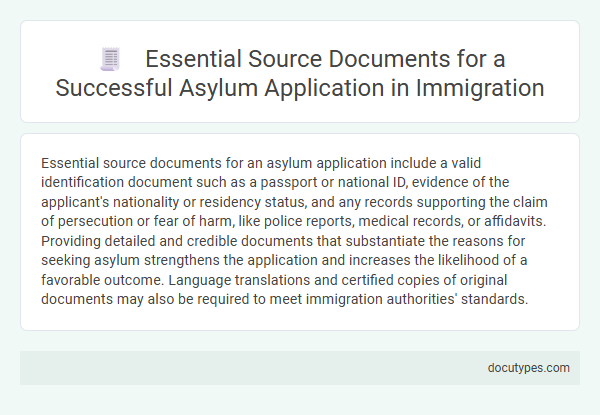Essential source documents for an asylum application include a valid identification document such as a passport or national ID, evidence of the applicant's nationality or residency status, and any records supporting the claim of persecution or fear of harm, like police reports, medical records, or affidavits. Providing detailed and credible documents that substantiate the reasons for seeking asylum strengthens the application and increases the likelihood of a favorable outcome. Language translations and certified copies of original documents may also be required to meet immigration authorities' standards.
Overview of Asylum Application Documentation Requirements
What source documents are required for an asylum application? An asylum seeker must provide personal identification documents, such as a passport or birth certificate, to verify their identity and nationality. Supporting evidence like affidavits, police reports, or medical records helps demonstrate the basis of their fear of persecution.
Personal Identification Documents Needed for Asylum
When applying for asylum, providing personal identification documents is crucial to establish identity and eligibility. These documents help verify your background and support your claim for protection.
- Passport or Travel Document - Serving as the primary proof of nationality, a passport or travel document confirms your identity and country of origin.
- Birth Certificate - A birth certificate establishes your date and place of birth, which is essential for identity verification.
- National Identity Card - This card verifies citizenship and personal details, supporting your asylum application with government-issued identification.
Submitting accurate personal identification documents strengthens your asylum application by validating your identity and asylum claim.
Importance of Passport and Travel History Evidence
Passport and travel history documents play a critical role in an asylum application. These records provide essential proof of identity and international movement.
Immigration authorities rely on passport stamps and visas to verify entry and exit dates, supporting claims of persecution or fear of returning. Absence of these documents may delay processing or weaken the applicant's case.
Gathering Birth and Marriage Certificates
Gathering birth and marriage certificates is crucial when preparing your asylum application, as these documents provide essential proof of identity and family relationships. Accurate and authentic source documents significantly strengthen the credibility of your case.
- Birth Certificates - Birth certificates verify your date and place of birth, confirming your identity and nationality for the asylum claim.
- Marriage Certificates - Marriage certificates establish family connections and legal marital status, which may affect eligibility for asylum benefits.
- Document Authenticity - Ensuring the certificates are official and translated if necessary helps prevent delays or rejections during the asylum process.
Collecting Proof of Nationality and Citizenship
Collecting proof of nationality and citizenship is a crucial step when preparing an asylum application. Gathering valid source documents strengthens your case and verifies your identity to immigration authorities.
- Birth Certificate - Provides official evidence of your place of birth and citizenship status.
- Passport - Serves as a primary travel document confirming your nationality and identity.
- National Identity Card - Offers government-issued confirmation of citizenship in many countries.
Documentation of Persecution and Threats
| Source Document | Description | Purpose for Asylum Application |
|---|---|---|
| Personal Affidavits | Written statements detailing experiences of persecution or threats. | Provides firsthand accounts supporting claims of harm or fear of harm. |
| Police Reports | Official records of reported incidents related to persecution or threats. | Corroborates the applicant's claims with formal documentation of attacks or harassment. |
| Medical Records | Records evidencing injuries from persecution or abuse. | Validates claims of physical harm and trauma endured by the applicant. |
| Human Rights Reports | Reports from organizations documenting country conditions and targeted persecution. | Demonstrates the broader context of threats and validates the risk faced by the applicant based on their profile. |
| Threatening Letters or Communications | Written threats, emails, or messages received by the applicant. | Direct evidence of intimidation or harassment supporting the asylum claim. |
| Witness Statements | Declarations from individuals who observed or have knowledge about the persecution. | Supports credibility of the applicant's testimony and provides additional perspective on threats. |
| Country Conditions Documentation | Official government or NGO documents describing systemic persecution in the applicant's home country. | Contextualizes the individual's fear by showing widespread or targeted human rights abuses. |
Supporting Medical and Psychological Records
Supporting medical and psychological records are crucial for strengthening an asylum application. These documents provide evidence of physical or mental injuries related to persecution or trauma experienced by the applicant.
Medical reports, hospital records, and psychological evaluations should detail diagnoses, treatments, and ongoing care. Expert assessments that link injuries or mental health conditions to the persecution claim enhance credibility. Include any relevant prescriptions, therapy notes, or affidavits from healthcare providers to substantiate the applicant's condition.
Evidence of Political, Religious, or Social Group Involvement
Evidence of your involvement in a political, religious, or social group is crucial for supporting an asylum application. Documents such as membership cards, letters from group leaders, or proof of participation in events demonstrate this connection effectively.
Additional supporting materials include photographs, affidavits from witnesses, and correspondence that highlight your active role. These documents help establish a credible claim of persecution based on group affiliation.
Letters of Support and Testimonies
Letters of support strengthen your asylum application by providing credible accounts from individuals familiar with your case. Testimonies from witnesses or community members offer valuable personal insights that corroborate your claims. Both documents serve as critical evidence to demonstrate the legitimacy and urgency of your asylum request.
What Source Documents Are Needed for an Asylum Application? Infographic

